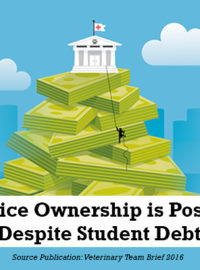
Practice Ownership is Possible Despite Student Debt
By: Carol Hart, JD, DVM
Looking to Buy
However, a veterinarian’s high student debt load is not necessarily an impediment to practice ownership. Ownership may even be the ticket to faster student debt retirement. Practice owners typically enjoy larger salaries than associates, can potentially amass greater wealth, and should capture other financial rewards (ie, return on investment in practice ownership). Owners of the well-managed practices surveyed in Benchmarks 2015: A Study of Well-Managed Practices reported average total compensation of $298,611 annually.3
Buying a practice does mean incurring debt, but as the debt is paid down, equity is built. Equity is the value remaining in an asset after deducting liabilities against that asset. For example, as payments are made toward a residential mortgage, equity is built in the real estate. Loans are usually for fixed periods (eg, 10 years for a business purchase, 25 years if real estate is included in the purchase). Once the practice debt is paid in full, the owner should have assets of significant value he or she can sell, such as the goodwill in the business and the accompanying real estate.
On the other hand, the wealth accumulation of a veterinary associate who never takes on practice ownership may be limited to what can be saved in retirement investment vehicles (eg, 401K plan).
Following Graduation
Qualifying for a practice loan is not out of reach, even for a veterinarian with high student debt, although he or she needs to be disciplined after entering the workforce to demonstrate creditworthiness and the character required to operate a business. Student loan payments should be made in a timely manner. Major purchases that increase monthly personal debt service should be avoided unless absolutely necessary. Credit cards are acceptable, but building high balances should be avoided and balances paid in full every month to demonstrate responsible credit use. A veterinarian hoping to purchase a practice may not qualify for a loan if he or she has assumed high consumer debt on top of student loans. (See Important Factors for Obtaining a Loan.)
Gaining Professional Experience
For a veterinarian whose goal is ownership, working for several years to gain practice experience and to demonstrate the character and skills a capable practice owner needs may be advantageous. He or she should spend time becoming skilled with clients and patients in the examination room, making diagnoses, formulating patient treatment plans, and establishing a strong professional reputation. A veterinarian who has taken these steps should be able to find a veterinary lender willing to help when the right practice opportunity (ie, one that suits the candidate’s personality, matches his or her practice style, has strong cash flow) comes along. The practice should bring in enough revenue after expenses (eg, wages, payroll taxes, drugs and medical supplies, laboratory fees, insurance, utilities, advertising, accounting and legal services, office supplies, bank fees) to allow the new owner to draw a sufficient salary to support his or her personal needs, service or pay the debt incurred to buy the practice, and pay student loan debt.
Conclusion
A high student debt load should not preclude a veterinarian from aspiring to own a practice. Taking the steps required to become an attractive candidate to lending institutions upon entering the veterinary workforce can lead to practice ownership sooner than one might think.
